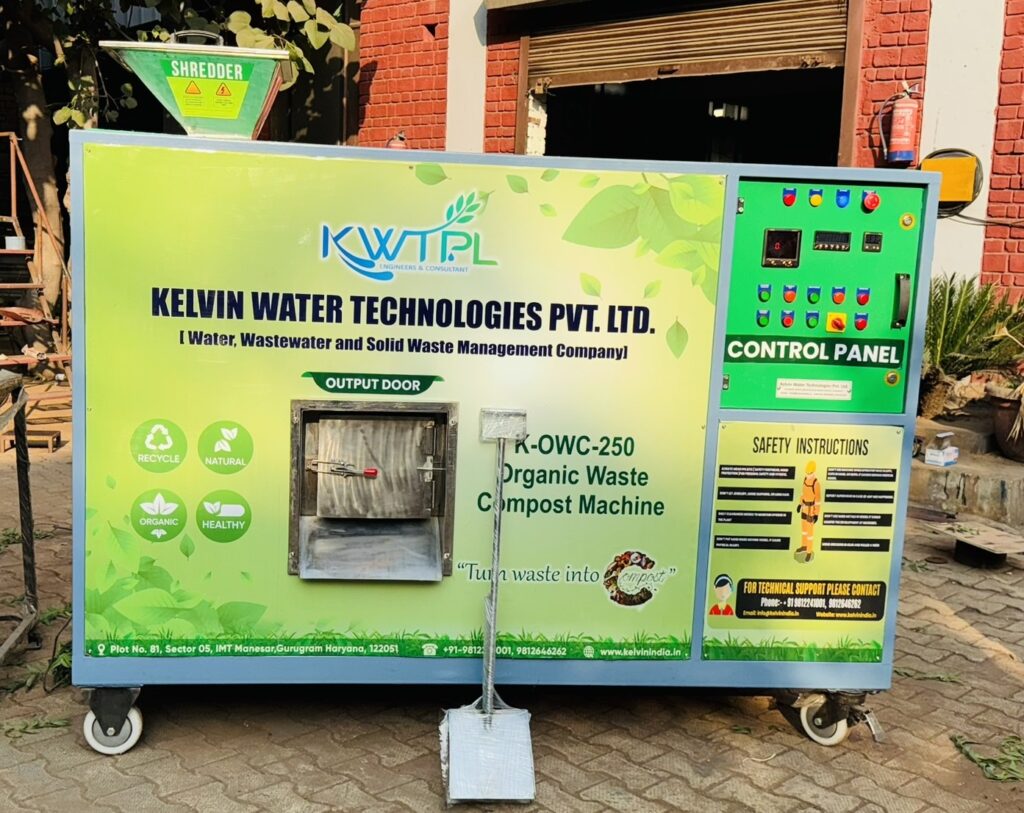Role of Composting in Organic Waste Management

Organic waste forms a significant portion of total waste generated worldwide—up to 50-60% in Indian urban areas alone. This includes food waste, garden clippings, agricultural residues, and other biodegradable materials. Improper disposal of organic waste often leads to environmental pollution, foul odour, greenhouse gas emissions, and overburdened landfills. Composting, however, offers an eco-friendly, economical, and sustainable solution to this problem.
What is Composting?
Composting is a natural biological process that breaks down organic matter into a nutrient-rich material called compost. Microorganisms like bacteria and fungi decompose the waste in the presence of air and moisture, transforming it into humus—a dark, earthy substance that enriches the soil.
This process replicates nature’s method of recycling organic material, accelerating it under controlled conditions to manage larger volumes efficiently.
Why is Composting Important in Organic Waste Management?
1. Reduces Waste Volume
Organic waste constitutes the largest portion of municipal solid waste. Composting can reduce the total waste volume by nearly 60%, easing pressure on landfills.
2. Prevents Methane Emissions
In landfills, organic waste decomposes anaerobically (without oxygen), releasing methane, a potent greenhouse gas. Composting is an aerobic process, drastically cutting methane emissions.
3. Improves Soil Fertility
The compost produced is rich in nutrients like nitrogen, phosphorus, and potassium. It enhances soil structure, improves water retention, and promotes healthier plant growth.
4. Reduces Need for Chemical Fertilizers
Compost acts as a natural fertilizer, lowering dependence on synthetic inputs which can degrade soil health and contaminate water sources.
5. Low-Cost and Scalable
Composting can be done at various scales—from individual households to municipal-level composting plants—making it adaptable and economical.
Types of Organic Waste Suitable for Composting
- Fruit and vegetable peels
- Leftover food (non-oily)
- Coffee grounds and tea leaves
- Grass clippings and leaves
- Agricultural residues
- Biodegradable packaging (e.g., paper plates)
- Plant trimmings
Common Composting Methods
1. Aerobic Composting
The most widely used method, it requires regular turning to provide oxygen. Suitable for backyards, housing societies, and institutions.
2. Anaerobic Composting
Done in closed, oxygen-free environments. It is slower but can be useful where turning is not feasible.
3. Vermicomposting
Utilizes earthworms to digest organic matter and produce nutrient-rich compost. Great for households and small-scale setups.
4. In-Vessel Composting
A closed, automated system ideal for large volumes of organic waste generated by hotels, apartments, and municipalities. It offers fast processing, odor control, and minimal space requirements.
Kelvin Water Technologies: Leading Composting Solution Provider
Kelvin Water Technologies Pvt. Ltd. is a top-tier Indian manufacturer offering innovative solutions for effective organic waste management. Their range of composting machines simplifies the composting process, enhances efficiency, and ensures environmental compliance.
Key Products Offered:
1. Fully Automatic Organic Waste Composter (OWC)
- Designed for residential societies, hotels, restaurants, and corporates.
- Converts organic waste into compost within 24–48 hours.
- Features include:
a). Automatic mixing, curing, and heating
b). Odor control system
c). Minimal manual intervention
2. In-Vessel Composting Machine
- Ideal for institutions and municipalities.
- Enclosed system with temperature and moisture control.
- Quick, hygienic, and space efficient.
3. Vermicomposting Units
- Customized pits and beds for small farms, schools, and NGOs.
- Promotes natural decomposition using earthworms.
4. Compost Curing Systems
- Final stage systems for enhancing the quality of compost after initial processing.
Steps Involved in Composting
- Segregation: Separate organic waste from plastics, glass, and metals at the source.
- Shredding: Reduces particle size, increasing surface area for microbes.
- Mixing: Balances carbon-rich (dry) and nitrogen-rich (wet) materials.
- Aeration: Turning or forced air systems maintain oxygen levels.
- Moisture Control: Moisture content should be 50-60% for optimal microbial activity.
- Maturation: Allow compost to cure for a few weeks to stabilize nutrients.
- Screening and Packaging: Sift out non-decomposed items. Pack compost for sale or use.
Applications of Compost
- Agriculture: Enhances crop yield and soil health.
- Gardening: Ideal for potted plants and kitchen gardens.
- Landscaping: Used in parks and green belts.
- Soil Remediation: Rebuilds nutrient-deficient or polluted soil.
Government Policies Supporting Composting in India
India’s Solid Waste Management Rules, 2016, mandate waste generators to segregate and compost biodegradable waste. Key government initiatives include:
- Swachh Bharat Mission: Promoting decentralized waste management through composting.
- Subsidies and Tax Benefits: For setting up composting plants or purchasing composting machinery.
- Urban Local Body Support: Technical and financial assistance for composting infrastructure.
Conclusion
Composting plays a pivotal role in managing organic waste sustainably. It not only diverts waste from landfills but also returns nutrients to the soil, enhances agricultural productivity, and supports environmental conservation. Whether at home, in housing complexes, or on an industrial scale, composting is the backbone of a circular waste economy.
With advanced composting machines from Kelvin Water Technologies, the process becomes simple, efficient, and scalable. By integrating composting into daily life or business operations, we take a significant step toward a cleaner and greener future.
Fully Automatic Organic Waste Composter Machine
Contact Us At:
| [wpfor |